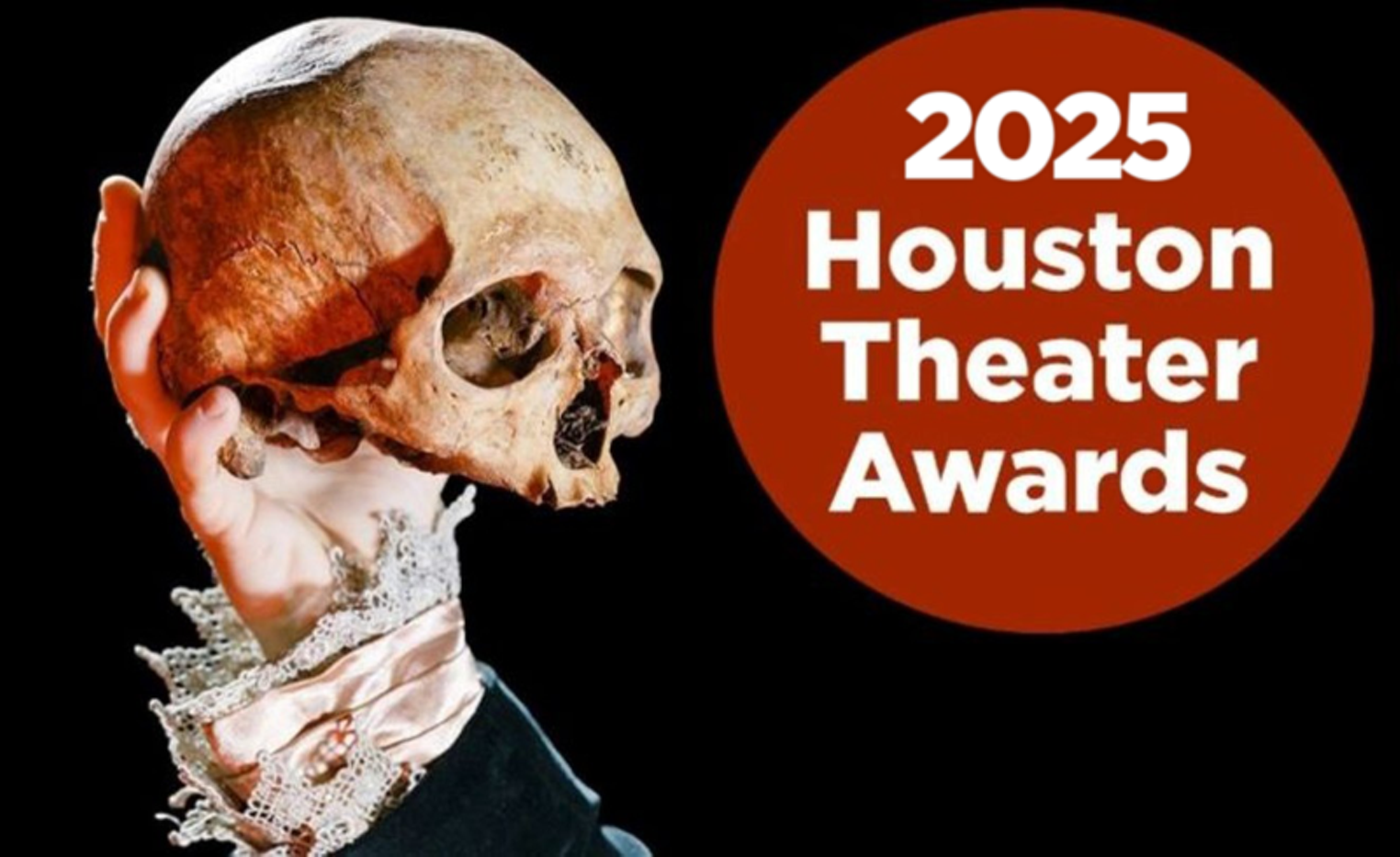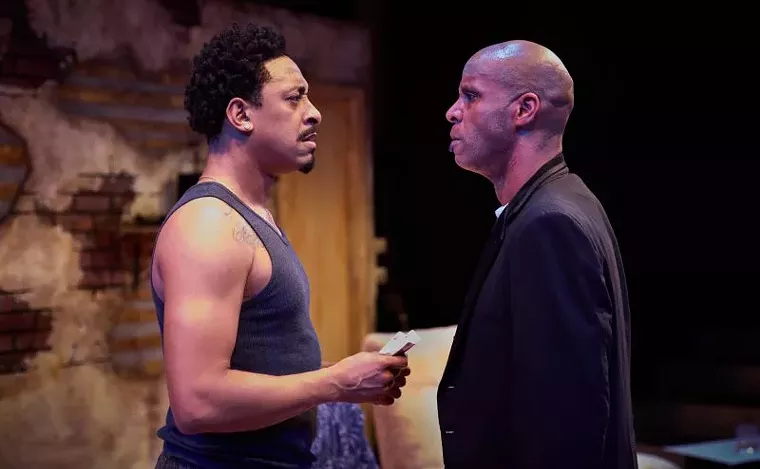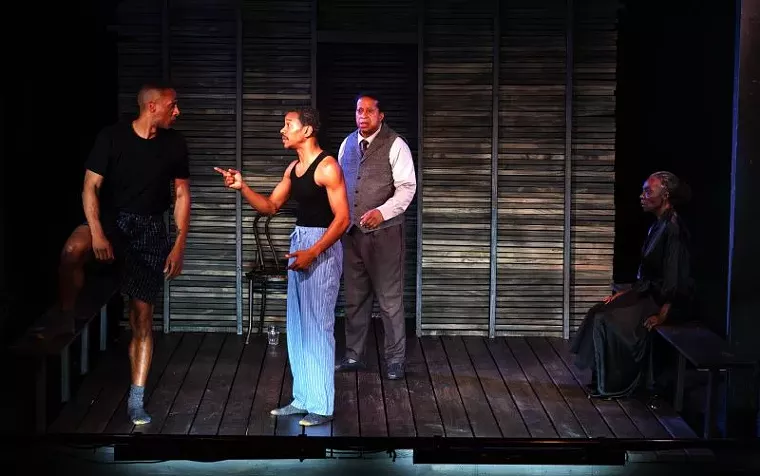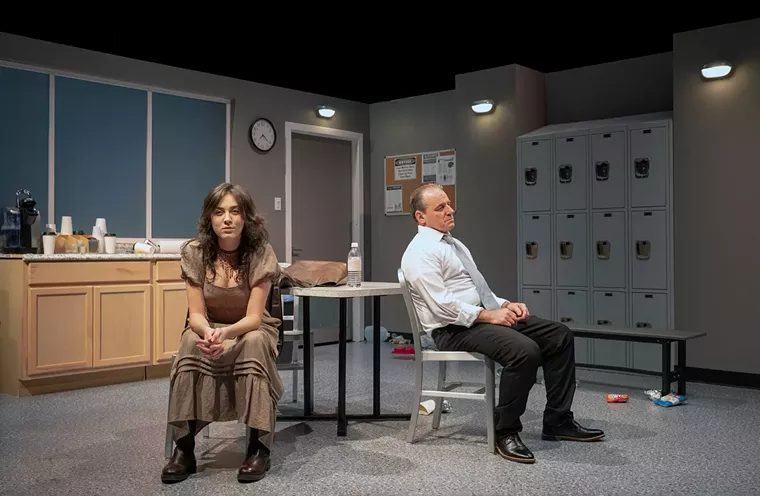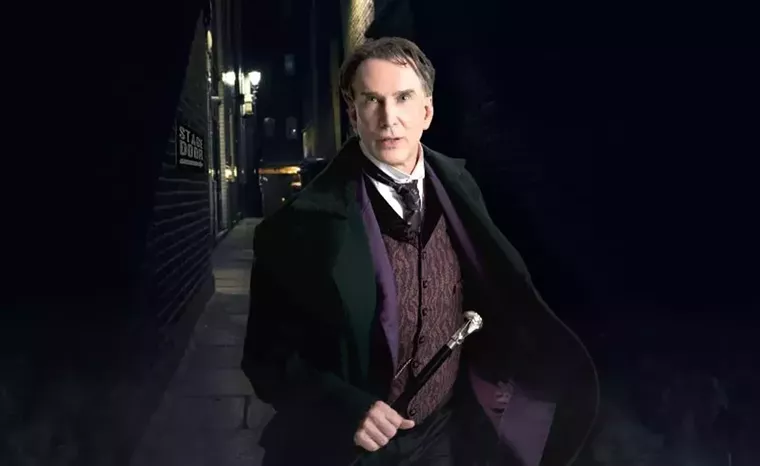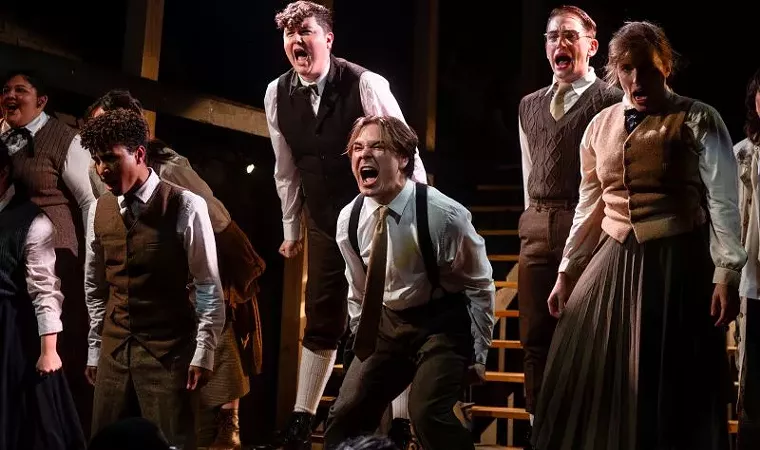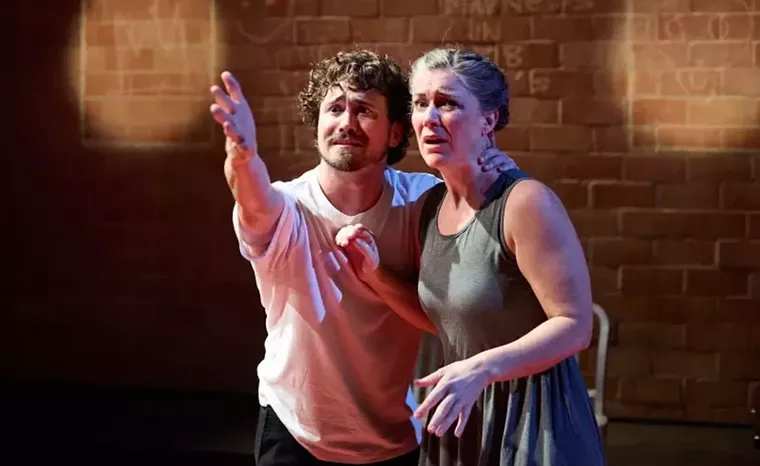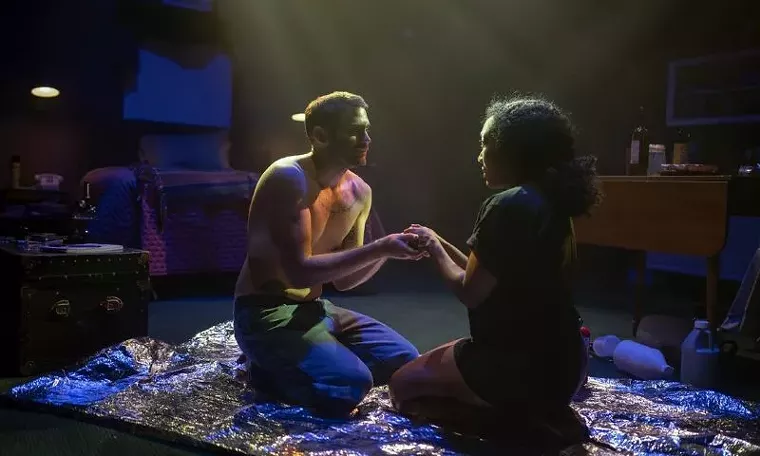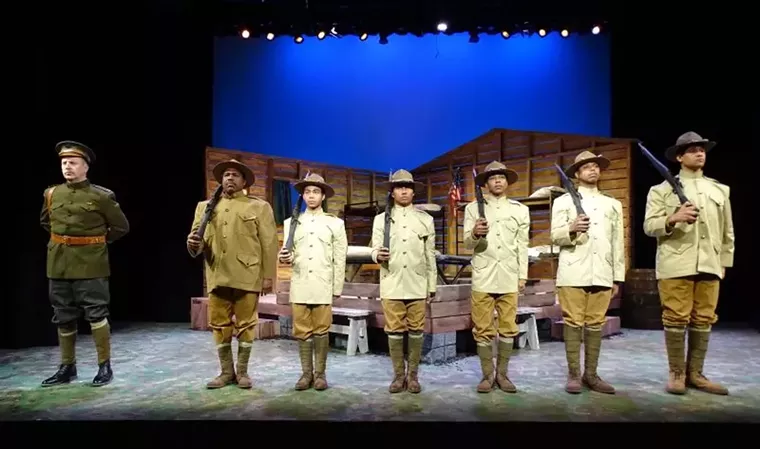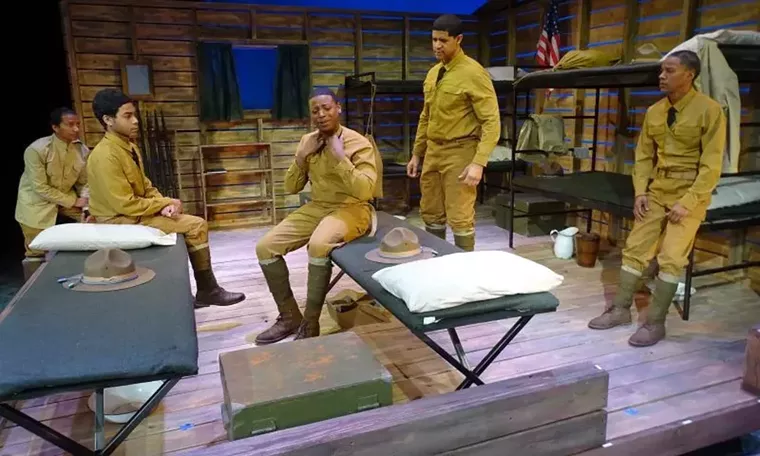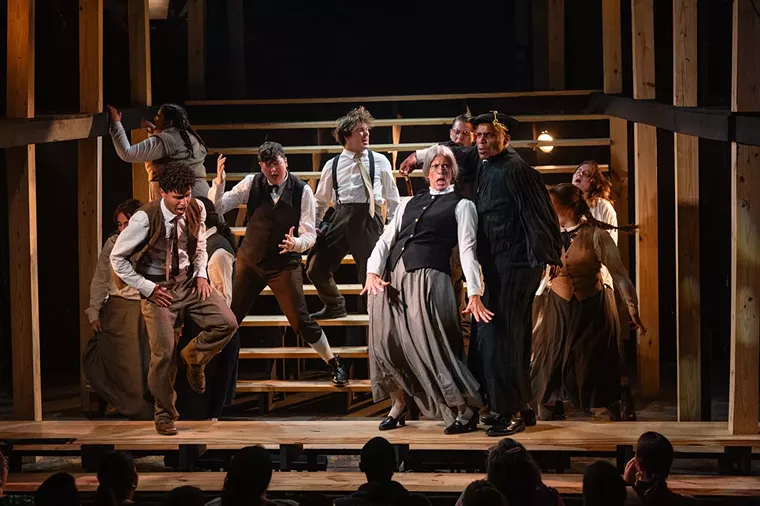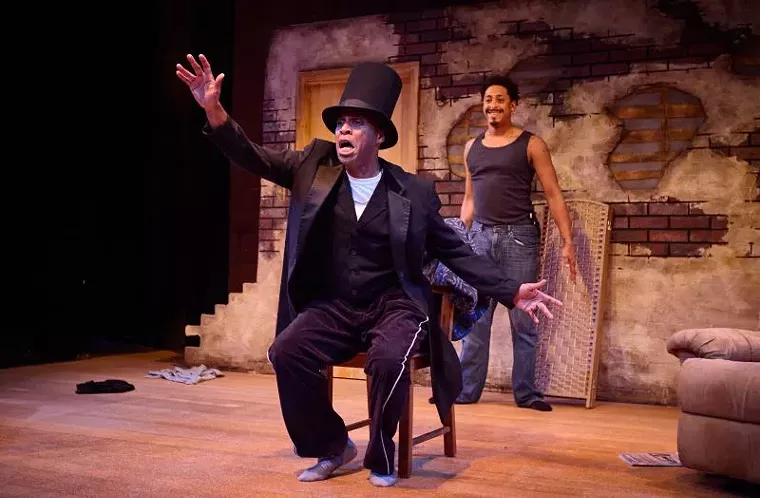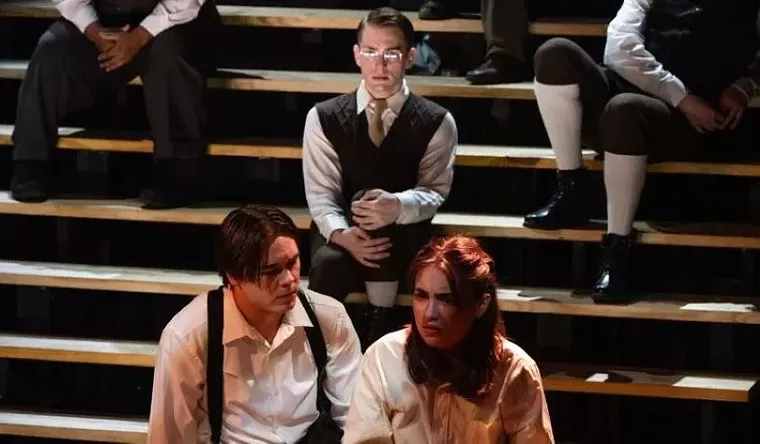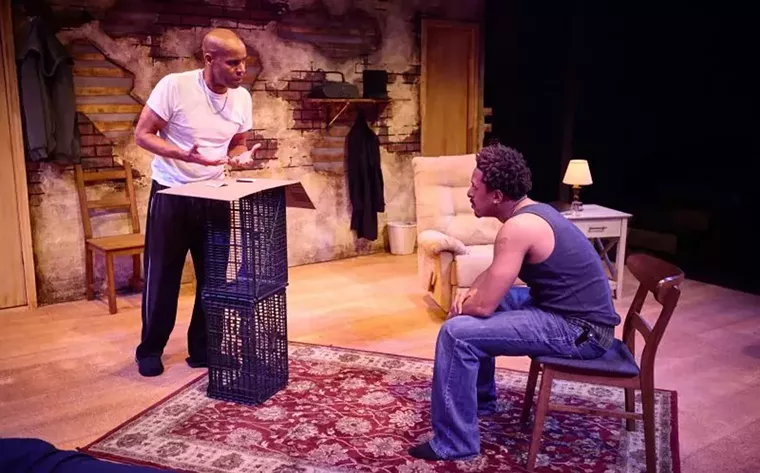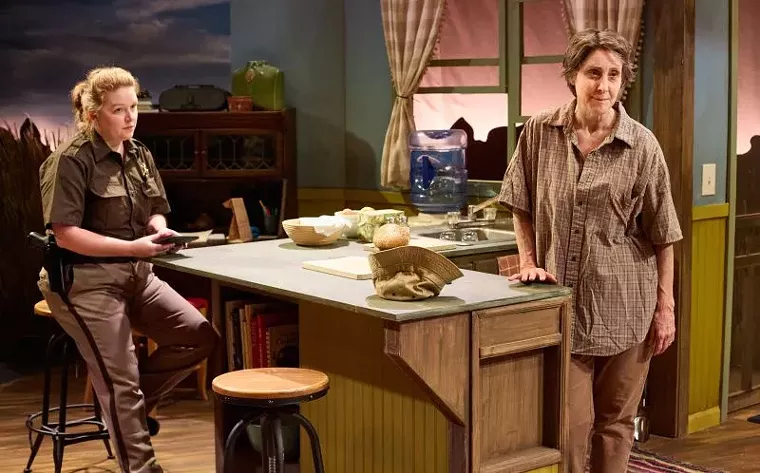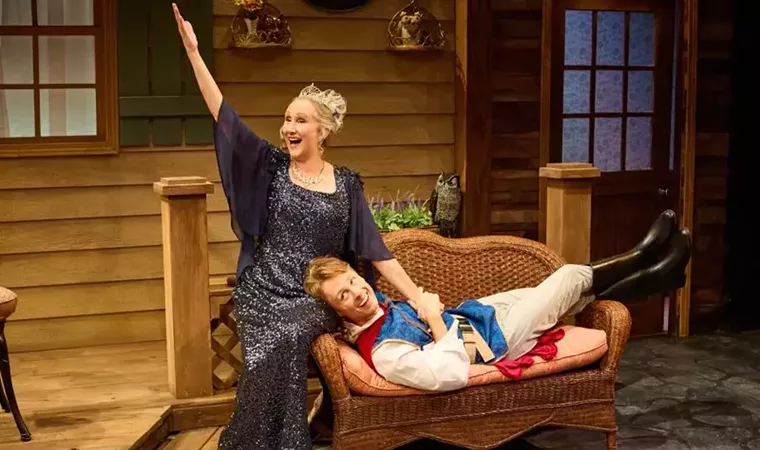Theater’s back and Houston’s got it.
The 2024-25 Houston theater, and Houston itself, returned in force after the restrictions imposed during the height of the COVID-19 pandemic. The shows had all the provocation, charm, intellect, and humor that graced the pre-pandemic seasons. The shows have grown up. Even old chestnuts have been refurbished for this new era. And the audience has seemed to enjoy this rebirth, this renewal.
It’s been a banner season, and we are grateful for it. The joy is infectious.
Look at the myriad of plays we’ve been blessed with, from all our companies: 4th Wall’s old-fashioned, exceptionally well-made play Swing State; the contemporary and telling update of Bedlam’s Hamlet; or the sheer perfection of Vanya and Sonia and Masha and Spike. Dirt Dogs’ ferocious, psychotic Bug and the chilling, toxic theatricality of Blackbird.
The utter joy found in the Alley’s Private Lives and the sheer elated surrealism of Primary Trust; Mildred’s Umbrella’s neighborly take on motherhood with Cry it Out; Rec Room’s diverse casting in Death of a Salesman; Main Street’s world premiere of the hitman comedy/drama Seven Assassins Walk Into a Bar; A.D. Players’ silly and impeccably acted The Foreigner or the haunting How to Die: The Life of Dietrich Bonhoeffer; Classical’s creepy Dracula; Catastrophic’s sad yet beguiling Love Bomb; The Garden Theatre’s electric Doubt; Stages’ nostalgia-tinged the ripple, the wave that carried me home; and so many more.
But it’s not just the work that challenged; everything did, from design to performance, sound to lighting. It was exciting to see pros like Pamela Vogel, Wesley Whitson, and David Rainey have renaissance roles that also challenged us. We were treated to a dreamlike, tatty St. Louis apartment; a vampire’s cobwebbed castle; a filthy trash-filled lunch room; old Germany with hot youths; a MacDonald’s restaurant; a garage apartment in Madrid; an Atlantic City hovel; a Bowery florist shop with a man-eating alien plant; an oil rig in the Gulf; everywhere on earth.
And what sounds we heard: an infestation of bugs through walls and under skin; rock music cranked to 11; sexy Argentinian tangos; the sounds of an oil spill with squawking gulls covered in goo; the smash of a beloved glass unicorn; the lone sound of “Taps” at Houston’s Camp Logan. All reverberated and kept us mesmerized.
We applaud all the following finalists and winners. You make us proud to report on the theater.
The 2024-25 theater season resounded with innovation and renewed professionalism. It was a season for thankfulness. May it continue. — D.L. Groover
Pamela Vogel and Wesley Whitson in 4th Wall’s production of Swing State.
Photo by Gabriella Nissen
BEST ACTRESS
Winner: Pamela Vogel as Peg in Swing State (4th Wall Theatre Co.) and as Joan Didion in The Year of Magical Thinking (Main Street Theater)
Two powerhouse leading roles right on top of each other at two different Houston theaters — Pamela Vogel amazed audiences once again in a stellar year. First up was her role as Peg in Swing State, which had her playing a widow living on the Wisconsin prairie. She’s troubled by the wilderness she sees disappearing before her eyes. Why are there fewer birds, bees, and wildflowers? Could this be pesticide runoff from her neighbor’s land?
At the same time, in another reclamation project, the former guidance counselor has hired a young handyman who’s spent time in prison. They have an easy camaraderie. But when some of her possessions go missing, the local sheriff with a grudge focuses all her attention on him. Peg starts to have suspicions as well, which leads to a tragic end to the 90-minute play.
In a role miles apart from that of a Midwestern widow, Vogel becomes the acclaimed author and intellectual Joan Didion in The Year of Magical Thinking. The one-woman play has her character working through the shattering developments in her life: her husband has died and her daughter is hospitalized with serious illness and eventually dies as well. National acclaim, as it turns out, is no defense against loss.
Rather than resorting to an overflow of wailing grief, Vogel as Didion mixes moments of nostalgia with hard clinical facts involving funeral arrangements and medical treatments. Occasionally, she expresses disbelief about what is happening to her.
Few actresses could have provided two such mesmerizing, honest, and profound performances in the same year. Fortunately, Pamela Vogel is one of those rare, accomplished actresses able to do just that, making her our clear selection for Best Actress.
Finalists: Callina Anderson as Agnes White in Bug (Dirt Dogs Theatre Co.), Nora Hahn as Sister Aloysius Beauvier in Doubt, A Parable (The Garden Theatre), Olivia Knight as Una in Blackbird (Dirt Dogs Theatre Co.), Chaney Moore as Lina in Cry it Out (Mildred’s Umbrella Theater Company) and Whitney Zangarine as Jessie in Cry it Out (Mildred’s Umbrella Theater Company).
Brandon Morgan as Booth and Timothy Eric as Lincoln—hard to imagine one without the other.
Photo by Gabriella Nissen
BEST ACTORS
Winners: Timothy Eric as Lincoln and Brandon Morgan as Booth in Topdog/Underdog (4th Wall Theatre Co.)
Lincoln and Booth are siblings who have been at odds for years, not helped at all by their father’s caustic sense of humor in giving them their in-conflict names at birth. Neither one has been successful in life, and they chafe at each other as much as the hand they’ve been dealt.
Their parents abandoned them at an early age, and they’ve been more or less joined together, whether they want to be or not, ever since.
Brandon Morgan as Booth is a loud, impulsive man who has created a scenario where if his older brother Lincoln, who used to be a card shark, would just show him how to handle that hustling game, his life would dramatically change its course. He bounces, he springs, he is overly optimistic about the woman he’s chasing for a girlfriend. He sees cheating at cards as a step up from stealing clothes from stores.
Timothy Eric is Lincoln, a former champion of three-card monte who’s finally gone straight and avoids the cards like a reformed alcoholic sidesteps the bottle. In his speech and the oh-so-tired way he carries himself, Eric portrays a much more reserved man, beaten down by life and just trying to get by. He ekes out a living as a white-faced Abraham Lincoln in an arcade. He worries that the arcade business is not going so well, and he may be replaced.
Both Eric and Morgan, each of whom has received accolades for their previous stage work in the Houston area, handle their roles with telling authenticity. There is no clear-cut good guy versus bad guy in this play. The ending is equally devastating to both.
What we are fortunate in is that two superb actors brought these troubled souls to life. Their portrayals were so on point that this was a theater experience in which no suspension of disbelief was required.
Finalists: Kyle Clark as Peter Evans in Bug (Dirt Dogs Theatre Co.), John Johnston as Charlie in The Foreigner (A.D. Players), Philip Lehl as Vanya in Vanya and Sonia and Masha and Spike (4th Wall Theatre Co.), David Rainey as Willy Loman in Death of a Salesman (Rec Room Arts), and Wesley Whitson as Ryan in Swing State (4th Wall Theatre Co.) and as Hamlet in Bedlam’s Hamlet (4th Wall Theatre Co.).
Helen (Sarah Sachi) reading a letter she has received from her daughter, Janice (LaKeisha Rochelle Randle), who is currently at her aunt’s farm for the summer.
Photo by Melissa Taylor
BEST SUPPORTING ACTRESS
Winner: Sarah Sachi as Helen in the ripple, the wave that carried me home (Stages)
Sarah Sachi has that indefinable quality that actors crave and work years to achieve: naturalness. A two-time finalist for Houston Theater Awards’ Supporting Actress (2023 and 2024), she has come into her own as strong independent mom Helen in Christina Anderson’s integrationist drama, the ripple, the wave that carried me home.
Helen, as a Black middle-class wife in ‘60s Beacon, Kansas, and former swimming teacher, takes a lesser role to husband Edwin (an invigorated, charismatic Joseph Palmore) as he – and then, she – protests to open the public swimming pool to all. Daughter Janice (LaKeisha Rochelle Randle) is traumatized by her childhood memories of her fear of water because of her lack of it, and will blame her parents for fighting for the rights of others before they fight for her.
The play wavers between the parents and Janice, but we’re always on the side of Helen and Edwin, whose relationship is full of music and dance, community activism, and a healthy, sexy respect for each other. When Edwin loses steam over constant years-long battles with the powers that be, Helen takes the reins and continues the fight no matter what obstacles the community puts in her path.
It’s not Sachi’s obstinate nature as Helen that convinces, but her ease as an actor. Is there any gesture that isn’t grounded in real life? Any cadence in her speech that doesn’t sound right and true? When she laughs while dancing with Edwin, who doesn’t laugh with her? She’s an infectious actor who never for a moment seems to be performing. Now that’s acting. And, by the way, she looks stunning in that ‘60s one-piece bathing suit.
Finalists: Amy Bruce as Annie in Love Bomb (The Catastrophic Theatre), Michelle Elaine as Corrina, Wally’s Waiter, and Bank Customers in Primary Trust (Alley Theatre), Melissa Molano as Laura in The Glass Menagerie (Alley Theatre), Sammi Sicinski as Adrienne in Cry It Out (Mildred’s Umbrella Theater Company) and Alexandra Szeto-Joe as Irina in Three Sisters (Classical Theatre Company).
(L-R) Brandon Carter, Kendrick Brown, and David Rainey in Death of a Salesman at Rec Room Arts.
Photo by Tasha Gorel
BEST SUPPORTING ACTOR
Winner: Brandon Carter as Biff in Death of a Salesman (Rec Room Arts)
We know Biff Loman, the one-time high school football star with a bright future ahead, who idolized his father, Willy. We also know Biff Loman, the 34-year-old sticky-fingered drifter with a knack for self-sabotage, a disillusioned son with a growing insistence on the truth – specifically, truth from his father.
In Arthur Miller’s Death of a Salesman, we see both, meaning the role of Biff requires the talents of an actor who can not only embody the youth in his glory days, the one who continues to dominate his father’s memories, and then, the grown man restless and broken by betrayal, but also someone who can be both at once.
Luckily, Rec Room Arts had the stellar Brandon Carter, an actor of exceptional skill who, in scenes from the past, foreshadowed the teenage fault lines that would eventually crack open and, in scenes from the present, showed us how the gospel according to Willy continued to haunt him like a ghost.
In a can’t-take-your-eyes-off performance, Carter created a Biff that felt whole, playing mirror and foil to David Rainey’s Willy with electrifying clarity. Carter impressed throughout the show, with several of the play’s big set pieces, like the reveal at the Boston hotel and his meeting with Bill Oliver, landing hard with stomach-sinking impact. Still, Carter locked up this award during Biff’s final confrontation with Willy, when Biff calls himself “nothing,” and says he’s “a dime a dozen” just like Willy. It’s a necessary reckoning and catharsis at the same time, though we know, devastatingly, that Biff’s attempt to pull his father out of the delusions that are drowning him can’t prevent the “something bad” from coming.
Finalists: Orlando Arriaga as Victor Prynne in Private Lives (Alley Theatre), Kendrick Brown as Happy in Death of a Salesman (Rec Room Arts), Benjamin McLaughlin as Tuzenbach in Three Sisters (Classical Theatre Company), Joseph “Joe P” Palmore as Edwin and others in the ripple, the wave that carried me home (Stages) and David Rainey as Bert in Primary Trust (Alley Theatre).
Olivia Knight and Kevin Daugherty in Dirt Dogs Theatre Co.’s production of Blackbird by David Harrower.
Photo by Gary Griffin
BEST BREAKTHROUGH
Winner: Olivia Knight as Una in Blackbird (Dirt Dogs Theatre Co.)
Ambiguity, rage, the weight of trauma, retribution, vulnerability, sexual power or sexual victim. As Una, in Blackbird, the postmortem play of an illegal May-December romance, Olivia Knight takes all these conflicting emotions and dares us to see her. To hear her. To understand just what she’s after, even if she herself isn’t sure.
Why is she visiting the man who went to jail for seducing her when she was underage? Knight kept us guessing throughout her explosive 90 minutes on stage. As a performer, she damn near radiated with the character’s conflicting, searing emotions. We couldn’t take our eyes off her.
We first noticed her in 2023 for her physically fluid performance as a boxer and unwilling adoptive mother in Rec Room’s production of Wolf Play. She was a well-deserved finalist in our awards that year.
But her turn as Una proved that Knight can singularly own the stage. Confidence, talent, and a deep understanding of a very multi-formed character. She showed all that to us in what was undoubtedly one of the most memorable performances of the season.
It’s one whopping way to break through in what was one of Houston’s better theater seasons. We look forward to seeing more of her talent in the seasons to come.
Todd Waite in one of his memorable roles as Sherlock Holmes.
Photo by Lynn Lane
REVIEWING A REMARKABLE CAREER
Goodbye, Mr. Waite?
If he’d ever paraphrase Norma Desmond in Sunset Boulevard, we can hear his clipped accent, “It’s not a retirement. I hate that word. It’s a pause.”
After 25 seasons as an Alley Theatre Resident Acting Company member, Todd Waite has said goodbye. His last performances occurred last April in his sixth appearance as the iconic detective Sherlock Holmes in Ken Ludwig’s Baskerville. Every performance garnered a standing ovation. He deserved every one.
But he’s not going anywhere. Yes, he’s left the Alley, but this is not farewell. The theater will always beckon, as it will this September when Waite steps onto the breach again as Sir Leigh Teabing in The Da Vinci Code. So much for a pause.
A distinctive actor, tall and lithe, born in Canada as Todd Postlethwaite, Waite resembled a thespian from past times, like matinee idol William Gillette, the first stage Holmes; or James O’Neill, father of Eugene; or perhaps Victorian star Richard Mansfield. He was a classic throwback, etched by footlights. His name listed in the Playbill brought an anticipation few others conjured. His height was a plus, for it allowed him to stand out on stage, but his presence was undeniable: somewhat regal, aloof, a man with an aura. Watch, he quietly radiated, I’m going to knock your socks off. And he did.
He always played well with others, bringing out their best, yet he managed to rise above even when surrounded by Alley regulars. This is no mean feat; they are a formidable company, but Waite seemed out of the ordinary. By no means a distraction, he was unique in movement, diction, characterization. We watched to see what he would do, and he didn’t disappoint.
In his 135 roles during his Alley career, he often dazzled. Remember his bitchy, soignée Crumpet the Elf in the one-man Santaland Diaries? He played this role for eight holiday seasons to full houses. He stood center stage in his silly green velvet elf costume under a pin spot, dangling a cigarette as if he couldn’t care less, and channeled Billie Holiday to comic perfection. Remember his dramatic turns in As Bees in Honey Drown (his debut Alley appearance) or the trans-species adulterer Martin in Edward Albee’s The Goat, or Who Is Sylvia?, or the repressed father in Pictures from Home? Maybe you recall his smug and contented Henry Higgins in Pygmalion.
His character roles were just as indelible. He rolled onto stage in his chair of state as sly Cardinal Richelieu in The Three Musketeers, stopping on a dime. The fatuous director Lloyd Dallas in Noises Off; his joyous, Scottish-burr-inflected Fezziwig in A Christmas Carol; or his sadistic Nazi Commandant Pister in the world premiere of Intelligence-Slave. And who could forget that mother from hell, that self-immolating Harriet Gottlieb in Dead Man’s Cell Phone? Clenching his highball as if mother’s milk, he had the best legs of them all.
We raise our glass to you, Todd Waite, and to the hours of enjoyment you have given us. Obviously, more will follow. We look forward to them with great pleasure.
Coordinated choreography.
Photo by Tasha Gorel
BEST CHOREOGRAPHY
Winner: Julia Krohn for Spring Awakening (Rec Room Arts)
What does teen spirit smell like? What does it look like? Adapted from Frank Wedekind’s 1891 scandalous and oft-censored drama, this 2007 Tony-winning musical from Duncan Sheik (music) and Steven Sater (book and lyrics) uses the forbidden-fruit drama of nascent sexual desire.
The innocence of these youths as they break into adulthood without any help from the elders meant to guide them can be devastating. They’re on their own.
Choreographer Krohn keeps the kids bouncing in thwarted passion, twitching in anticipation of their new raging hormones. This new world of their changing bodies is alien, but so seductive. The entire ensemble is infected with this strange mood, grinding and feeling their way to forbidden territory. It’s toe-tapping sex, set to an arpeggio of tinkling harmonium. The musical sings with life. Teen spirit is eternal. It’s also catching. You may not be able to smell teen spirit, but through Krohn’s bump-and-grind movement, you can definitely see it.
Finalists: Dan Knechtges for Frozen (Theatre Under the Stars) and Monica Josette for Little Shop of Horrors (Theatre Under the Stars).
Wesley Whitson and Christy Watkins in Bedlam’s Hamlet at 4th Wall.
Photo by Gabriella Nissen
BEST OMNI PERFORMER
Winner: Wesley Whitson
Was this the year of Wesley Whitson? Three indelible performances: the down-on-his-luck truck driver Ryan in Swing State (4th Wall), the ultimate star-making turn as Hamlet in Bedlam’s Hamlet (also at 4th Wall), and the silly Clown #2 in countless cameos in The 39 Steps (Main Street). We think he can do anything.
His former appearances in Houston prove our point. Do you remember his creepy boy scout Hugo in Feathers and Teeth at Mildred’s Umbrella (2017)? It was a startling introduction to this young actor, whose repertoire only enlarged and deepened through the years. He’s won our Best Supporting Actor and been a finalist many times over.
There were the double roles of Fool and Cordelia in King Lear and a fey and mischievous Puck in A Midsummer Night’s Dream (Houston Shakespeare Festival); nerdy Logan in Chicken & Biscuits and beaten down tattooed ex-con Jason in Clyde’s (Ensemble); office opportunist Dean in Gloria (4th Wall). He shape shifts with insouciance and always has the right moves or tics for his characters. He never disappoints. One of Houston’s best, this year he shined in his trio of performances. He just had to receive our Omni Award.
Callina Anderson and Kyle Clark in Bug at Dirt Dogs Theatre Co.
Photo by Gary Griffin
BEST LIGHTING
Winner: John Baker for Bug (Dirt Dogs Theatre Co.)
Lighting a show that’s slippery on reality but heavy on discomfort could have been like a mosquito taking fly-bys at your eardrum. You know it’s there, but how do you capture it when landing seems elusive?
You’ll forgive the insect metaphor; this is Bug we’re talking about. A folie à deux creepy thriller where the unlikely lovers are holed up in a decrepit motel room, certain the government has infected them with flying flesh-eating aphids.
To get the mood correct, the way the show looks is just as important as what it says. Thanks to John Baker’s lighting prowess, Bug oozed with increasing patinas of dystopic squalor as the play progressed.
Initially, he gave us a motel room, dark enough not to make out all the dirt but with enough glare to know it wasn’t exactly sanitary.
As the insanity of the show ramps up, Baker’s lighting dances in two-step. Darker, grittier, scuzzier, more disturbing. Can we see the bugs flying around in all that darkness? Maybe. Or maybe it’s just the shadows. Either way, we’re icked the hell out.
Special note also goes to Baker for his tasteful lighting on the nude scenes in the show. We saw what we needed to see and no more. Actors were taken care of properly—no small deal.
It’s not often that lighting makes us want to tear off all our clothes and shower with bleach. We hope Baker has a giggle thinking of his part in that.
Finalists: Stefan Azizi for Spring Awakening (Rec Room Arts), Bryan Ealey for Topdog/Underdog (4th Wall Theatre Co.), Roma Flowers for Love Bomb (The Catastrophic Theatre), Edgar Guajardo for Dracula (Classical Theatre Company), Jules Houston for Spill (Moody Center for the Arts at Rice University) and Kris Phelps for Flex (The Ensemble Theatre).
The sound work of Michael Mullins played like a full length symphony in Bug.
Photo by Gary Griffin
BEST SOUND
Winner: Michael Mullins for Bug (Dirt Dogs Theatre Co.)
In Bug (Dirt Dogs Theatre Co.), Michael Mullins employs a horrifyingly itch-inducing sound design.
At some point, one imagines director Malinda L. Beckham saying, “Aphids…I need flying, biting, skin-burrowing aphids!” and Mullins smiling, knowing he had just the thing.
However those discussions went, Mullins’ realization of the show’s need for maybe real, maybe not, insects turned into a character unto itself. Never cartoony, his insect buzzing played like a full-length symphony with climbs, lags, and crescendos building to a fury that no one sees coming. The characters were uncomfortable; we were uncomfortable. Everyone was itching. It was perfection.
Also perfect was the accompanying overhead helicopters circling. Again, real? Not real? Are they really there or also a figment of the character’s imagination? In Mullins’ hands, we heard the choppers but also sensed something felt off with how they sounded.
The totality of Bug’s sound design was immensely creepy, all puns intended. And there’s no way this show could have worked without it. So, it’s especially gratifying to give the award for sound to the show that hinged most strongly on this design element and more specifically to Mullins, the talent who made it happen.
Finalists: Jon Harvey for Dracula (Classical Theatre Company) and Robert Leslie Meek for Spill (Moody Center for the Arts at Rice University) and for Toros (Rec Room Arts).
The oh-so-carefully crafted uniforms taking us back to 1917 Houston.
Photo by Eisani Apedemak-Saba
BEST COSTUMES
Winner: Krystal Uchem for Camp Logan (The Ensemble Theatre)
When the all-Black 3rd Battalion, 24th Infantry Regiment, arrived in Jim Crow-era Houston to guard the construction site set to become Camp Logan in 1917, they were met with racial discrimination and, eventually, outright violence. Less than a month later, a riot erupted between the soldiers and the white civilians and police. When all was said and done, military tribunals found 110 soldiers guilty and executed 19. Never before and never since has the United States Army executed so many American soldiers en masse.
Though those convictions were overturned and the soldiers granted honorable discharges in 2023, the Houston Riot of 1917 will remain a shameful chapter in both local and American history. This season, for The Ensemble Theatre’s production of Celeste Bedford Walker’s Camp Logan, Krystal Uchem’s costume designs made that past, as difficult and painful as it may be, real.
Uchem showed a keen eye in the construction of the military uniforms we saw on stage, her meticulous sense of detail apparent from head to toe. Or, more specifically, from broad-brimmed campaign hats to puttees. Those leg wraps and hats, along with the high collars, belted waists, and crisp coats, all grounded the production in its historical context, echoing the uniforms worn during The Great War, particularly by segregated units like the 24th.
The earthy, militaristic color palette was composed of neutrals – khakis, tans, and browns – that fit seamlessly within the wooden walls of the barracks crafted by set designer Philip Graschel, creating a world both cohesive and authentic. It’s clear Uchem knew her marching orders and delivered to perfection, making history come alive on stage.
Finalists: David Arevalo for Private Lives (Alley Theatre), Lilli Lemberger for Three Sisters (Classical Theatre Company), Macy Lyne for Spirits to Enforce (The Catastrophic Theatre), Juan Saracay for Miss LaRaj’s House of Dystopian Futures (The Catastrophic Theatre), Leah Smith for Dracula (Classical Theatre Company) and Spill (The Moody Center for the Arts at Rice University), and Paige Willson for The 39 Steps (Main Street Theater).
The BP catastrophe remembered in docu-drama form in Spill.
Photo by William Bossen
BEST SET DESIGN
Winner: Ryan McGettigan for Swing State (4th Wall Theatre Co.) and Spill (Moody Center for the Arts at Rice University)
Talk about being back. Does Mr. McGettigan have more of our Theater Awards than any other nominee? He deserves them all, of course, for his talent knows no bounds. Never does he repeat himself in his stunning work. He constantly surprises with either glamour, grit, dreamy surrealism, or naturalism. He pins each play with his spot-on designs.
This season, he did superlative work. In Rebecca Gilman’s Swing State, he used photo realism to depict the Wisconsin farmhouse kitchen where feisty Peg counts her seeds for planting and waits for the end of the world. It was a defining portrait of Peg herself: a banging screen door, a worn-out kitchen table and chairs, a porcelain bowl above the old refrigerator, a chopping block for slicing walnuts for her beloved zucchini bread, and a large kitchen knife on the counter. The plains of the countryside spread out beyond the door. It smelled of rural life. It was sturdy, plain, no fuss.
Spill, however, with only three performances, was theater incarnate. A surreal and symbolic dissection of the disastrous and deadly 2010 Deepwater Horizon oil rig blowout in the Gulf, author Leigh Fondakowski (The Laramie Project; Gross Indecency) documented the oilmen, the suits, the loved ones of the dead, the innocents who got sick. It was kaleidoscopic and epic in theme, and McGettigan’s set covered the entire Moody Center theater.
A huge projection screen was center stage, which served as a lava lamp of sorts for waves, oil sheen, TV newscasts, symbolic doodles, tarred seabirds. The floor was stained with rust, the catwalks were used as rig ramps and walkways, and a ladder at the side was climbed by workers. With stunning sound work and atmospheric lighting, McGettigan’s set was as immersive in the extreme as was the play. It was gorgeous work for a most stirring production. His new award was doubly well-earned.
Finalists: Afsaneh Aayani for Dracula (Classical Theatre Company), Stefan Azizi for Spring Awakening and Winter Solstice (Rec Room Arts), Nicholas Graves for Topdog/Underdog (4th Wall Theatre Co.), Zhuosi “Joyce” He for The Heart Sellers (Stages), Mark A. Lewis for Bug (Dirt Dogs Theatre Co.) and Tanya Orellana for Private Lives (Alley Theatre).
Rachel Simone Webb and the company of the North American tour of & Juliet.
Photo by Matthew Murphy
BEST TOURING PRODUCTION
Winner: & Juliet (Memorial Hermann Broadway at the Hobby Center)
The only disappointing thing about the production of & Juliet that stopped in Houston in January was its weather-shortened run. Those who were, however, lucky enough to catch it, courtesy of Memorial Hermann Broadway at the Hobby Center, got a shot of sheer fun, a joyride through pop-music perfection, and The Bard, getting a clever and contemporary revision.
The premise of the book, by David West Read, is simple: Anne Hathaway, the wife of William Shakespeare and a storyteller in her own right, wants her husband to give his tragedy Romeo and Juliet a new ending – one that doesn’t feature Juliet meeting the pointy side of a dagger. Anne’s got a few ideas, and soon enough, Juliet gets a new beginning, friends, and a Parisian excursion. The show is irreverent, meta, and, as a jukebox musical, it’s all set to songs composed by Swedish composer Max Martin, the purveyor of pop behind hits from boybands (*NSYNC and the Backstreet Boys), pop princesses (Britney Spears, Katy Perry, and P!nk), and more (Bon Jovi and Céline Dion).
Luke Sheppard directed the bubbly production, with attention-demanding sets from Soutra Gilmour and sequined, ruffly costumes from Paloma Young, all lit by Howard Hudson’s creative lighting designs. And then there was the cast, embarrassingly talented and led by the gorgeously voiced Rachel Simone Webb as Juliet. They not only belted and bopped along to the Swede’s impressive catalog, they did justice to Read’s cheeky script and Jennifer Weber’s sometimes familiar, often athletic, and always energetic choreography. It was a colorful romp, complete with pyro and confetti, that left us with those – in the words of Justin Timberlake – “sunshine in my pocket,” “good soul in my feet” kind of feels.
Finalists: Funny Girl (Memorial Hermann Broadway at the Hobby Center), Hamilton (Memorial Hermann Broadway at the Hobby Center), Parade (Memorial Hermann Broadway at the Hobby Center) and The Book of Mormon (Memorial Hermann Broadway at the Hobby Center).
Telling the story of the men who were supposed to go to France who never got out of Houston.
Photo by Eisani Apedemak-Saba
BEST ENSEMBLE CAST
Winner: Elia Adams, Kristopher Adams, Kendrick “Kay B” Brown, Jason Carmichael, Foster Davis, Tanner Thomas Ellis and Roc Living in Camp Logan (The Ensemble Theatre)
Celeste Bedford Walker’s Camp Logan is mostly tell, don’t show. The racial hostility leading up to the 1917 Houston riot is offstage, which leaves its actors to paint the full picture. To both tell the story and register its effects on their faces, carry its weight in their bodies. And over at The Ensemble Theatre, that’s exactly what the actors did with devastating clarity, and the picture they painted was damning.
Elia Adams was green as Charles Hardin, a Minnesotan encountering racism at this level for the first time. The character is optimistic, his belief that the service of Black soldiers is crucial to changing how America treats its Black citizens so strong that he quit school to enlist. His earnest and downright naïve idealism contrasted powerfully with Tanner Thomas Ellis’s Jacques Bugaloosa Honore, a soldier from Louisiana who revealed the past brutality visited upon him with shattering effect. As Robert Franciscus, an MP with a do-right approach whose powerlessness grows as he sees his authority stripped in the face of racist pressure, Kristopher Adams was frustration and helplessness personified.
Roc Living supplied the production with much-needed humor and effortless charm as Gweely Brown, a native Houstonian with insight into what’s in store for the men in his hometown. Like Living, Kendrick “Kay B” Brown brought a bit of crackle as Joe Moses, a Northerner with a temper and a dangerous propensity to push back at the city’s Jim Crow laws.
Leading the regiment was Jason Carmichael, a former Houston Theater Award winner for Best Actor, who once again delivered a tour de force performance as Sergeant McKinney, a man deeply conflicted, visibly caught between duty and the welfare of his men. The play’s anchor, Carmichael often played opposite Foster Davis’s Captain Kuelke, the unit’s seemingly benevolent and unsurprisingly duplicitous white captain. At the end of the day, he’s a man willing to sacrifice his soldiers for the sake of the status quo and in his own self-interest. And, in Davis’s hands, he does it with little more than the shrug of a bureaucrat.
Camp Logan is truly an ensemble piece, and the soldiers’ camaraderie, in turns easy and then tenuous as the unseen world outside the barracks closes in on them, was undeniably the award-winning pulse of the production.
Finalists: Philip Hays, Philip Lehl, Christy Watkins and Wesley Whitson in Bedlam’s Hamlet (4th Wall Theatre Co.), Jazmyn Bolden, Sydney Deone Cooper, Kiya Green, Krystal Uchem, An’tick Von Morpxing and Sierra Wilturner in Flex (The Ensemble Theatre), Elizabeth Bunch, Michelle Elaine, Dylan Godwin, Chris Hutchison, Melissa Molano, David Rainey, Nicole Rodenburg, Christopher Salazar and Todd Waite in Noises Off (Alley Theatre), Noel Bowers, Raymond Compton, Tamarie Cooper, Jovan Jackson, Bryan Kaplún, Jenna Morris Miller, Karina Pal Montaño-Bowers, Rebecca Randall, Kyle Sturdivant, Clarity Welch, Abraham Zeus Zapata and Walt Zipprian in Spirits to Enforce (The Catastrophic Theatre), Marco Camacho, Elena Coates, Austin Colburn, Timothy Eric, Nonie Hilliard, Shannon Hoffman, Adam Kral, Kayla Meins, Megan Mottu, Camryn Nunley, Cameron O’Neil, Dariel Silva and Jacqueline Vasquez in Spring Awakening (Rec Room Arts), Patricia Duran, David Gow, Philip Lehl, Skyler Sinclair, Jasmine Renee Thomas and Kim Tobin-Lehl in Vanya and Sonia and Masha and Spike (4th Wall Theatre Co.) and Alan Brincks, John Dunn, Susan Koozin, Adina Opalek and Spencer Plachy in Winter Solstice (Rec Room Arts).
Some of the seven assassins.
Photo by Ricornel Productions
BEST NEW PLAY/ PRODUCTION
Winner: Seven Assassins Walk Into a Bar by Dain Geist
Houston actor/author Dain Geist (his last acting gig was Main Street’s world premiere Memoriam from this season) has written an actor’s dream play in his black comedy Seven Assassins Walk Into a Bar. There are, indeed, seven characters. All are different, and the cast sparks as they interact. All are hitmen, and six of them arrive at a bar to honor one of their own, the great star Bartleby who has recently been shot dead. He’s the one in the casket, and the six former friends, lovers, rivals have come to pay their respects.
It doesn’t take long until old grievances bubble to the surface and everyone is reaching for his/her gun. Their backstories are intriguing and funny as hell. Some are dangerous and trigger-happy like unfeeling Midas (Callina Anderson in tight and riveted black leather). One is suave and gay with a penchant for semi-automatics, that would be CIA-trained Vane (Brad Goertz).
Rabbit (Kara Greenberg) is a woke feminist who does not like being talked down to; Taft (Christianne Mays) tries too hard to keep the peace and has hidden agendas; Green (Saroa-Dwayne Sasa) is the newbie whose reputation has risen after he killed a noted bad guy; Montana (Seth Carter Ramsey) is the hot-head, who shoots first then doesn’t bother asking questions.
No one questions their motives for killing without regard to who they are offing. They each have their own defense and justification for what they do for an uncommon day job, so moral thinking is far outside their box. But think they do, as they discuss motivation, how they like to kill, and what it means to kill a good guy versus a bad guy.
It’s this complex view that switches the play into fun territory while we in the audience wait for the inevitable explosion. Through the talk, we sit on the edge of our seats. That’s as good an example of theater we can think of. Please write another one, Mr. Geist.
Finalists: The Janeiad by Anna Ziegler (Alley Theatre), Memoriam by Noga Flaishon (Main Street Theater), and The Heart Sellers by Lloyd Suh (Stages).
Rec Room gave us a whole new perspective on Spring Awakening.
Photo by Tasha Gorel
BEST MUSICAL
Winner: Spring Awakening (Rec Room Arts)
Fun fact – some of us at Houston Press actively dislike the musical Spring Awakening. That is, until we saw what Rec Room could do with it. And really, shame on us for doubting that the thrillingly creative team at this small but mighty company could make us a believer.
From the moment those sexually repressed but blossoming teens descended the brilliantly devised scaffolded staircase that anchored the show’s action, we knew we were in for something special.
Forget the big splashy productions we’ve seen in the past. Rec Room’s intimate space brought us up close to the yearning, passion, and anguish as these teens journey from adolescence into adulthood.
And what a cast it was! Some new to Rec Room, some fresh to the stage, this powerhouse group sang, danced, and emoted until no hormone was left unchurned. New talents were discovered and new performers featured. It was a thrill ride of actorly discovery.
The music, a rock/pop explosion, filled Rec Room with uber-rebellious bravado thanks to the spirited onstage band. No orchestra pit here, the up-close music was delivered right to our lap, forcing us to lean in and listen equally well to the show’s horny ups and darker downs.
Spring Awakening was a scandal when it premiered as a play in 1906 Berlin. It became a sensation 100 years later when it was adapted as a musical for Broadway. But at Rec Room, it became something different again. Still audacious with teen spirit, but newly intimate and personally persuasive.
Who knew that smaller could be better for Spring Awakening?
Finalists: Little Shop of Horrors (Theatre Under the Stars), Love Bomb (The Catastrophic Theatre) and Waitress (Theatre Under The Stars and The 5th Avenue Theatre).
Timothy Eric as Lincoln and Brandon Morgan as Booth.
Photo by Gabriella Nissen
BEST PLAY/PRODUCTION
Winner: Topdog/Underdog (4th Wall Theatre Co.)
Suzan-Lori Parks wrote this incendiary play in 2001. Winner of a 2002 Pulitzer in Drama and a 2023 Tony revival winner, it has lost none of its fire. It is the tale of two brothers, inheritors of generations of dysfunction, neither one of whom knows how to negotiate life or even their closest relationships.
Everything about this production at 4th Wall was first-rate. Brandon Morgan and Timothy Eric carried the show in such a striking, eloquent fashion. Director Aaron Brown, Head of Musical Theatre at Texas State University, deftly orchestrated the action in the small, intimate space that is Spring Street Studios, the audience right in there with them in that sad and depressing apartment, designed by Nicholas Graves.
As troubled as the brothers’ relationship was, who in the audience couldn’t identify with the near misses and misunderstandings in any family relationship? The envy about one who has a bit more money than the other, the false hero worship, the optimism that with just one more break, everything will be all right. The pessimism that just waits for the next foot to fall.
There were moments of alleviating comedy as well. Booth comes back from one of his store forays and takes off layer after layer of clothes he’s stolen. Whenever we think he’s done, he’s not. He steals a bathrobe for Grace and ends up comically humping it, which is about as close as he’ll ever get to the object of his affections.
A large part of what made this season so outstanding for 4th Wall, Topdog/Underdog was such an important compelling drama presented so well, that Houston theater-goers who saw it are probably still thinking about it now and then even today. That’s great theater.
Finalists: Bug (Dirt Dogs Theatre Co.), Camp Logan (The Ensemble Theatre), Cry It Out (Mildred’s Umbrella Theater Company), Spill (Moody Center for the Arts at Rice University) and Vanya and Sonia and Masha and Spike (4th Wall Theatre Co.).
Matt Hune’s staging of Spring Awakening was filled with challenges, most effectively rendered.
Photo by Tasha Gorel
BEST DIRECTOR OF A MUSICAL
Winner: Matt Hune for Spring Awakening (Rec Room Arts)
No one knows how to make a small space feel momentous like Matt Hune.
Last year, the Rec Room Artistic Director was nominated for directing an enchantingly vast Neverland landscape in the company’s production of Peter Pan. This year, he one-upped himself by taking a brash Broadway musical, massaging it onto the tiny Rec Room stage and achieving the seemingly impossible – a show that felt both intimate, gargantuan, and just plain better than other iterations we’ve seen.
Hune’s love of letting his actors shine was abundantly evident in this production, which featured mostly new performers to Rec Room. The standouts were almost too plentiful to count and the synergy Hune elicited from his talented cast made it seem like a group with a long, successful history of making theatrical magic together.
And that scaffold staircase! Seemingly floating up to the darkly lit heavens, it anchored the production and Hune’s action for the show. The cast ascended, descended, flanked, sat, lay, stomped, grinded, and wailed on those stairs like it was a beloved home. It was a finely tuned visual jigsaw that Hune superbly utilized to expand and enrich our view.
To say staging this show in this space was a risk is an understatement. We can only imagine Hune’s directorial challenge once the choice was made. And while we can’t fathom how he does it, we do know that this year we are ever so thankful he did it so darn well.
Finalists: Melissa Rain Anderson for Little Shop of Horrors (Theatre Under The Stars) and Lisa Shriver for Waitress (Theatre Under The Stars and The 5th Avenue Theatre).
Timothy Eric and Brandon Morgan play brothers living on the edge, handicapped by wounds never resolved.
Photo by Gabriella Nissen
BEST DIRECTOR OF A PLAY
Winner: Aaron Brown for Topdog/Underdog (4th Wall Theatre Co.)
Aaron Brown teaches Topdog/Underdog in his classes at Texas State University. What he has always really liked about the play is the layers it unveils as it tells the story of two brothers who are never able to overcome their early lives, sabotaged by a terrible pair of parents.
“There is no clear final moral, final lesson from the play. Really [playwright Suzan-Lori Parks] is challenging us to find the humanity in these two characters.”
He took that same approach when he started rehearsals for Topdog/Underdog at 4th Wall with Brandon Morgan and Timothy Eric. “Who are these people? What leads them to this moment that this audience is witnessing?” Also: “We’re all having conversations about ‘Why are you saying that now?’ You all have been living together for months. ‘So why are we having this conversation now?'”
While he was part of the audition process in which they saw a lot of talented actors, interestingly enough, Morgan and Eric were never able to audition together. Brown worked with them both separately. But it took a leap of faith to cast them before he’d seen how they could work together. And as clearly reflected in our Best Actors and Best Play Awards this year, it worked.
The years Brown has spent thinking about and teaching Topdog/Underdog paid off in the way he was able to direct the play. As he noted in an interview with the Houston Press last February:
“You don’t have to be a hero. You don’t have to be a ‘good person’ to have your story told. Many of us are a product of our parents, of our legacy, of our traumas, and we’re trying to do the best we can. In this play, we see two brothers who are trying to cope with trauma that they never really got to heal from, and now, as adults, what do traumatized adults do when they feel like they’re backed into a corner? We don’t necessarily have to agree with those actions, but we can leave the theater with an understanding of why they did what they did. And maybe hope to create a world in which those aren’t the only options for people we meet in the world today.”
Wow. Besides awarding Brown Best Director of a Play honors this year, we’re ready to go back to college and sign up for his classes.
Finalists: Malinda L. Beckham for Bug and Race (Dirt Dogs Theatre Co.), Jennifer Dean for Swing State and Vanya and Sonia and Masha and Spike (4th Wall Theatre Co.), Jason Nodler for Spirits to Enforce (The Catastrophic Theatre), Weston Twardowski for Spill (Moody Center for the Arts at Rice University), Kim Tobin-Lehl for Bedlam’s Hamlet (4th Wall Theatre Co.), Brandon Weinbrenner for Noises Off (Alley Theatre) and Allie Woods, Jr. for Camp Logan (The Ensemble Theatre).
Faith Fossett and Pamela Vogel in Swing State at 4th Wall.
Photo by Gabriella Nissen
BEST ARTISTIC DIRECTOR
Winner: Jennifer Dean (4th Wall Theatre Co.)
No, that’s not Jennifer Dean in the above photo looking tired and exhausted. That’s Pamela Vogel in her role as Peg in Swing State at 4th Wall Theatre Co., one of two reasons she won Best Actress for the 2024-25 season.
But it almost could be Dean when you consider all the work she’s done in her first full year as Artistic Director for 4th Wall (co-founders and former artistic directors Philip Lehl and Kim Tobin-Lehl, while still involved with the theater, have handed over the reins to her).
With a sure eye for what makes a strong season, she gave us the laughter of Vanya and Sonia and Masha and Spike and the serious and absorbing Swing State. Then there was Bedlam’s Hamlet, which made the same old, same old new and bright. And Topdog/Underdog, a tour de force for Houston actors Timothy Eric and Brandon Morgan.
She stepped into the director’s role for Vanya and Sonia and Masha and Spike and Swing State with what theater reviewers like to call a sure hand. This isn’t the first time one of the plays she’s directed has been awarded honors. In early 2020, she directed The Realistic Joneses for 4th Wall, which went on to win Best Play and Best Ensemble and nab her the Best Director award.
It clearly helps that she acts as well (The Pavilion at 4th Wall in 2023) giving her a good understanding of what makes actors thrive in any production.
Excellent play selection coupled with a strong ability to cast the right actors combined to make her first season as artistic director a standout one. The Best Artistic Director category was a very competitive one this year (as usual). But it was impossible to ignore what this theater veteran was able to accomplish given the helm for the first time. We look forward to a lot more.
Finalists: Malinda L. Beckham (Dirt Dogs Theatre Co.) and Matt Hune (Rec Room Arts).
Kim Tobin-Lehl and David Gow in Vanya and Sonia and Masha and Spike at 4th Wall Theatre Co.
Photo by Gabriella Nissen
BEST SEASON
Winner: 4th Wall Theatre Co.
The phrase “perfect season” is not one to be thrown around lightly, but when it comes to 4th Wall Theatre Co. this year, let us make the case.
By now, you’ve read much about 4th Wall’s blistering production of Suzan-Lori Parks’ Topdog/Underdog, this year’s winner of Best Play/Production, and its cast and crew, including Best Director of a Play winner Aaron Brown and the joint winners of Best Actor, Timothy Eric and Brandon Morgan. But though Topdog/Underdog proved to be the brightest star in the sky this season, the rest of 4th Wall’s season captivatingly sparkled, too.
The season started with Swing State, Rebecca Gilman’s intimate four-hander that situates the politics implied by its title on a human level, exploring the effects of COVID, grief, addiction and recovery, and threats to the environment. Best Artistic Director winner Jennifer Dean, who directed this production approached it with clear eyes and gentle hands, placing the utmost trust in her superb cast, led by Best Actress winner Pamela Vogel. The result was timely and bruisingly honest naturalism, all set against Ryan McGettigan’s award-winning set, a salt-of-the-earth, lived-in Wisconsin farmhouse.
Dean returned to direct Christopher Durang’s farcical and Chekhovian Vanya and Sonia and Masha and Spike, an achingly funny crowd-pleaser with episodes of dysfunction and absurdity that reveal the play’s heart, where we find all-too-familiar regrets and fears beating wildly. Once again, it’s a play made for a talented ensemble, and once again, 4th Wall assembled a dream team. Of special note is Philip Lehl’s second-act rant as Vanya, easily one of the best and most memorable moments we saw on stage all season.
Bedlam’s Hamlet closed the season, and if you’re tired of hearing us praise the company’s ensemble work, well, you’re about to be exhausted. That’s because the cast again amazed us, shape-shifting their way through Bedlam’s stripped-down approach to The Bard. It was a masterfully minimalist, precision operation overseen by Director Kim Tobin-Lehl, which made every second of the three-hour-long show worth every minute. And, of course, as the Prince of Denmark, Wesley Whitson delivered quite the feat, gifting us with another of the season’s stand-out performances.
If it’s not obvious, we’re running out of superlatives to throw at 4th Wall, and you know what? We wouldn’t have it any other way. As such, our congratulations goes to 4th Wall Theatre Co., this year’s winner of Best Season.
Finalists: Dirt Dog Theatre Co. and Rec Room Arts.
